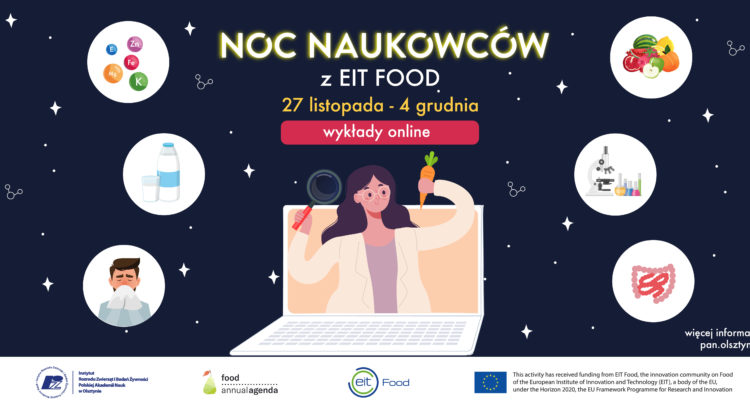On 27th of November we will celebrate the European Researchers’ Night for the 15th time! On this occasion, researchers from the Institute of Animal Reproduction and Food Research of the Polish Academy of Sciences in Olsztyn will conduct a series of 15 online lectures for schoolchildren. The lectures prepared within the EIT Food #AnnualFoodAgenda project will address the most interesting topics in the area of food, nutrition and health.
Remote teaching does not have to mean routine! Invite scientists from the Institute of Animal Reproduction and Food Research of the Polish Academy of Sciences in Olsztyn to your class and join the celebration of science in Europe! Funded by the European Institute of Innovation and Technology (EIT Food) lectures will be a source of knowledge, inspiration and will cover the most current topics related to healthy eating and sustainable consumer behaviours. We will learn about the bacteria that inhabit our intestines and how we can strengthen our immune system with food. We will check when we should follow a gluten-free diet and take a closer look at the facts and myths about the quality of farm fish. We will take a closer look at one of the most serious diseases of the 21st century – obesity – and see if fatty tissue can devour calories! And once we are on the subject of health and food, we will also learn about the most popular food allergens, how to preserve food to make it survive in most extreme conditions, and why we sometimes do grocery shopping not guided by our heart and mind, but … our nose!
The European Researchers’ Night will run from 27th of November to 4th of December. Register your school and become a part of the most important researchers’ day of the year! Each lecture will include a knowledge quiz with rewards for the most attentive students.
The lectures are aimed at pupils in the final grades of primary school and secondary school students. In order to be able to register a class for the event, basic technical requirements must be met: work on a platform that will enable the researcher to join the lesson (including sharing the screen, etc.), and have an online quiz tool (Kahoot!).
